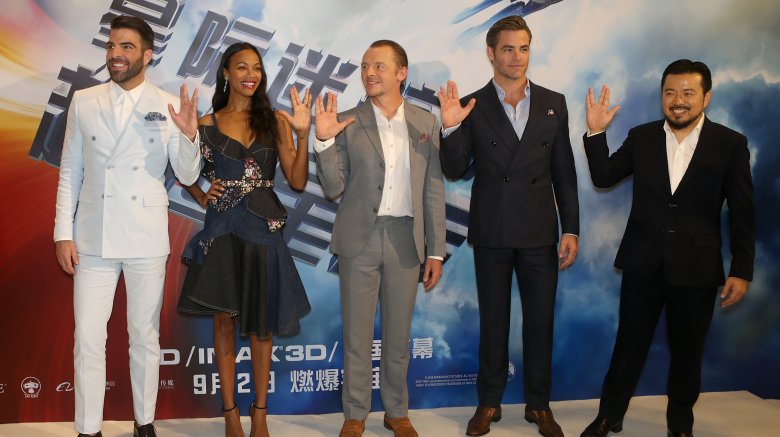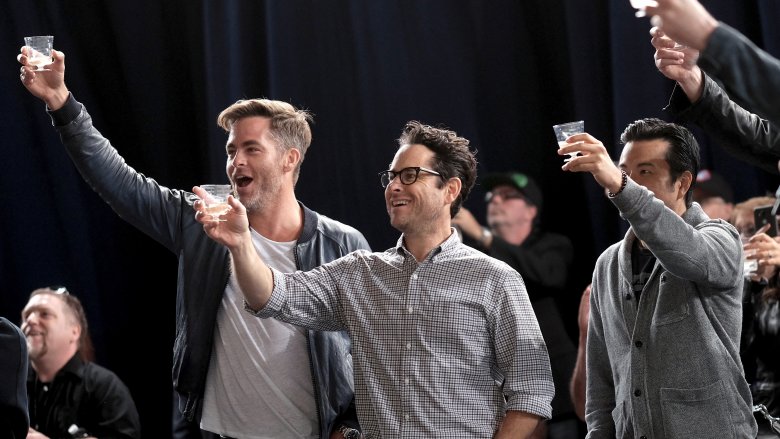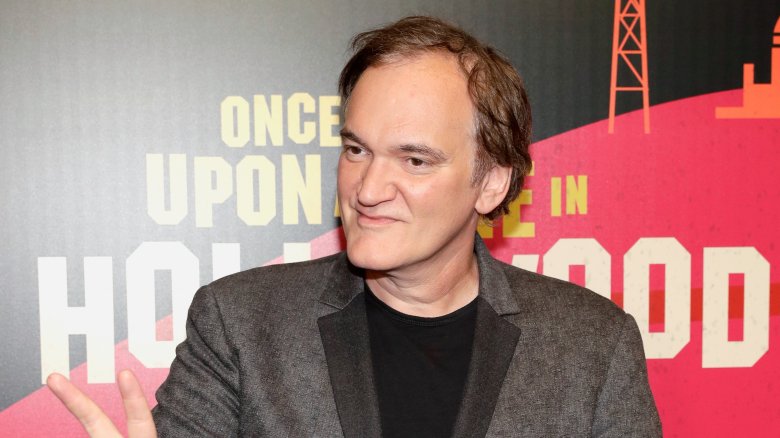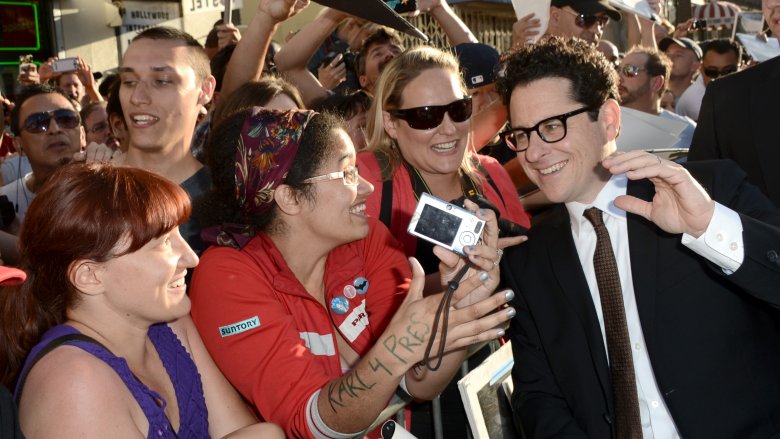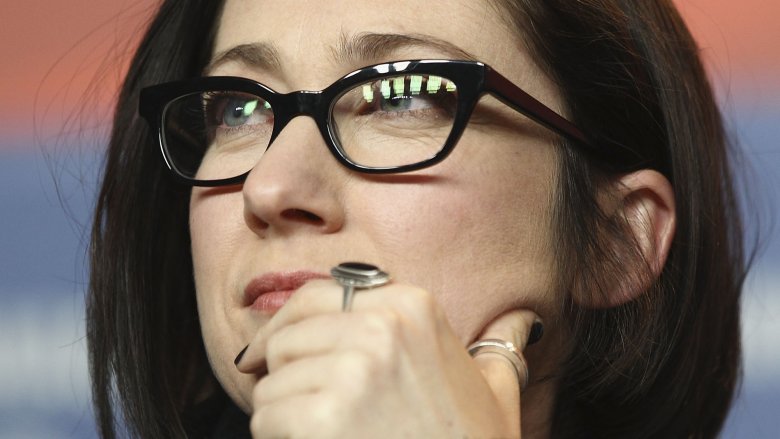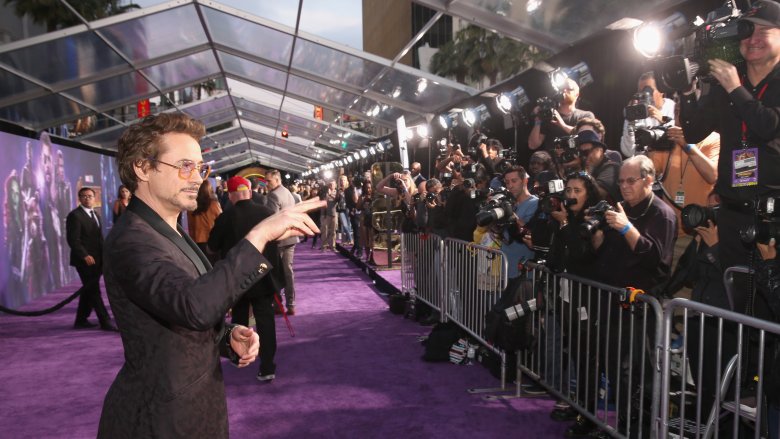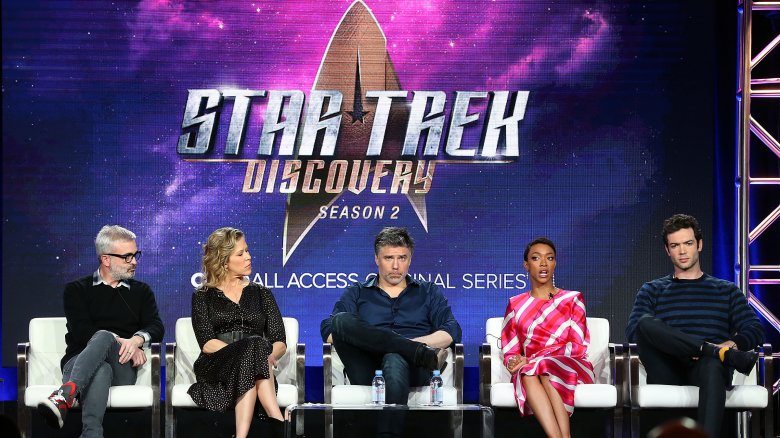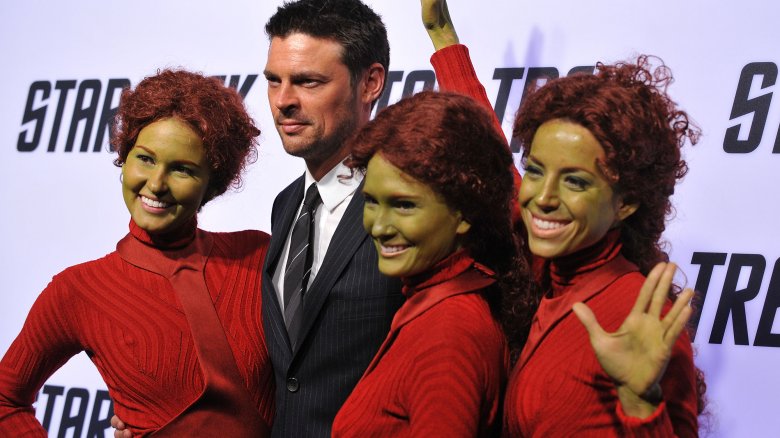The Real Reason Star Trek 4 Was Canceled
Star Trek isn't just a beloved adventure series, geek colossus, or science fiction touchstone at this point — it's a dominant cultural force. From Captain James T. Kirk to Captain Jean-Luc Picard, from the Gorn to the Romulans, from the video games to the commemorative lunchboxes, it's near and dear to the hearts of millions. The movies are no small part of this: starting in 1979 with Star Trek: The Motion Picture, the films have risen, fallen, and risen again, establishing themselves as a perennial fixture on the silver screen.
The most recent Trek series, begun in 2009 with the simply titled Star Trek, began as a proud part of this legacy. Trek was a critical and commercial hit, garnering a brand new fanbase and a sequel in no time flat. But in 2019, one decade after the series' rebirth, Star Trek has floundered. Star Trek 4, the follow-up to Star Trek Beyond, has been officially canceled and its stars scattered to other franchises and projects. How could this have happened when its cast are enjoying success elsewhere and its first movie started with such a bang? It turns out that success has become a lot more complicated since 2009, even for one of the biggest franchises around.
Too much directorial shuffling
Part of the beauty of the Star Trek universe is how many different takes, visions, and ideas fans are able to see applied to the classic Wagon-Train-in-space formula. Across time and medium, there have been multiple minds at the helm of the story, each with their own style of cinematography, concept of characterization, and visual flair. Some love J.J. Abrams' slick take on the Enterprise and her inhabitants, some prefer Gene Roddenberry's original work, some are Deep Space Nine diehards. And the wonderful thing is, they can coexist. Everyone has their favorite captain, everyone has their favorite director.
But there is a dark side to this directorial shuffling, and it's part of why the films have run aground. Star Trek 4 changed hands more than once: Quentin Tarantino and S.J. Clarkson were both rumored as directors, then a confusing pseudo-clarification was made stating that Clarkson's movie would be separate and released before Tarantino's. Multiple writers and producers were named, changed, and named again. No vision was ever truly able to coalesce between any of these creators, and the fans had nothing to center their excitement around. Now the project has run aground entirely and no one is even really certain what might have been — the film was never able to settle around any one team or vision. It just proves the old adage right: You don't want too many captains on the bridge.
Tarantino's proposal of an R-rated Star Trek
The journey to Star Trek 4 has been so bizarre, so messy, and so positively twisted, that Quentin Tarantino being up for the director's chair at some point takes up merely a single bullet point. But it's real, and it happened: the pop-culture-blending, violent-minded, ever-colorful talent behind Inglorious Basterds, Pulp Fiction, and Kill Bill fame was, briefly, going to direct Star Trek 4. And he was already ready to fulfill the conclusions everyone immediately jumped to: Right off the bat, he promised to deliver the first R-rated Star Trek movie.
Reactions were mixed. On the one hand, Tarantino is a celebrated auteur with a legion of devoted fans. On the other hand... does his vision make sense for Star Trek? Even those in tune with his work had doubts. Star Trek has grappled with sensitive, violent, and dark material before, but there's City on the Edge of Forever and then there's Uma Thurman scalping Lucy Liu with a samurai sword. A complicated reception is never a good thing for a fandom-centric franchise and likely played a role in the film's demise. So much for our hopes of a katana-wielding Uhura.
An inability to rein in the budget
Money makes the world go around, and there's no place where that's more true than in Hollywood. Though Star Trek was, for quite a long time, an underdog of a franchise, it's been a cash cow for far longer at this point. People are devoted to its vision of a better world, its charismatic cast of characters, and its thrilling sci-fi adventure — and they'll pay to access it. The first of the most recent Star Trek films did well, by this measure. But as Into Darkness and Beyond premiered, the series began to slump financially.
Making a movie like Star Trek is no mean feat. It takes experts in combat, innovative costume designers, and some of the most sophisticated computer graphics artists on the planet. Even the most frugal approach will take millions, and Star Trek 4 needed to rein in the budget. But, simultaneously, no one wants to see a Star Trek movie without the kind of spectacle that inflates budgets far beyond their original parameters. The problem was, ultimately, never solved as the tension between expectations and budget proved to be one more step on the road to Star Trek 4's cancellation. In Hollywood, money can make you or break you, and Star Trek is currently broken.
Box office drop-off
Dire financial straits weren't always the case for Star Trek, however. The first film of the recent series, released in 2009, was a box office smash (in addition to its critical accolades) and garnered a solid little fandom of its own full of people willing to pay for the delight of brand new adventures in the form of tickets, merchandise, convention specials, and more. The sequel, Into Darkness, was unable to recreate the success of the first film: critically and commercially, it was a step down. It was not, however, a failure, and so the world saw the third movie debut with Star Trek Beyond. This was, unfortunately, a true step down as the film decidedly underperformed and ended up lost in the shuffle of Suicide Squad, Ghostbusters, and Jason Bourne.
The writing was on the wall: Star Trek was on a downward slope that showed no signs of changing course any time soon. A great movie can turn anything around, of course — but great movies are great because they're uncommon. Despite the many visions announced, despite the auteurs that could have put their impressive (and hopefully lucrative) stamps on the Trek universe, despite the fact that Star Trek has come back from worse, ultimately, those holding the purse strings didn't want to test it. Star Trek 4 had the stink of financial failure upon it from the beginning.
Casting turmoil
An enormous piece of the puzzle that made the 2000s Trek movies the success they largely were was the fantastic cast. Zachary Quinto as Spock brought new warmth to the famously chilly Vulcan. Zoe Saldana proved to be a quippy wonder as Lt. Uhura. Even the smaller roles shone — who wasn't immediately endeared to Gaila, Uhura's chipper Orion roommate? People love Trek for a lot of reasons, but there's a reason the debate always comes down to favorite captains: we're all, ultimately, in it for the characters.
There's no bigger personality on the Enterprise than Captain Kirk, and Chris Pine proved to have an irresistible take on the role. Whether he was acing the Kobayashi Maru or romancing a fellow cadet, he was a smooth-talking rogue you couldn't help but root for. Pine's charisma lit up the screen and became a linchpin of the film's success — a fact that ended up curse as much as blessing. Star Trek 4 endured months of rumors about casting turmoil, and in August 2018, it was revealed that talks to secure Pine (and Chris Hemsworth as his father) had fallen through. There's no Star Trek without Kirk, and no 2000s Star Trek without Chris Pine. Now there's no Star Trek in the cinema at all.
Actors' other commitments
The stars of Star Trek were at their brightest when the series premiered, and the film's success only launched them to further heights. Success has particularly been found in superhero movies, Zoe Saldana's Gamora and Chris Pine's Steve Trevor being the most prominent examples. The former ended up at the center of the Marvel Cinematic Universe's war between Thanos, Gamora's galaxy-conquering father figure, and the Avengers; the latter romanced Wonder Woman in her breakout hit. This is, theoretically, a good thing for the Star Trek series. Their stars have only grown in prominence and success! They're juggling multiple blockbusters and the global public has proven they'll pay to see them do their thing, to the tune of billions of dollars!
Unfortunately, a cast being wildly beloved parts of more than one franchise has a big fat downside. And it's not just that filming schedules conflict (though that's definitely part of it) — it's that, as the Trek series started to fall off financially, one franchise became the clearly superior choice. Enthusiasm waned among Saldana and Pine's camps in particular, and, well, now we know them better as Gamora and Trevor. Good for their careers, bad for Trek fans.
S.J. Clarkson snapped up for Game of Thrones
As already mentioned, one of the people up for the director's chair on Star Trek 4 was S.J. Clarkson. A British television director known for her work on Heroes, House, and Orange is the New Black, she was expected to collaborate with writers J.D. Payne and Patrick McKay and producers J.J. Abrams and Lindsey Weber. Her work has a history of being the kind of sharp, funny, clever entertainment the Star Trek franchise thrives on, and excitement quickly grew over what her take on the Enterprise might look like.
Unfortunately, as with Saldana and Pine, Clarkson's attention was divided between multiple franchises. Though it was announced in April 2018 that Clarkson was due to direct Star Trek 4, January 2019 saw the announcement of Clarkson as the director for HBO's Game of Thrones prequel. We can never know to what degree this decision was influenced by the surrounding turmoil of the movie's development, but it is likely that this was a contributing factor in her decision to hitch her wagon to a different horse — and another part of why the film just couldn't get off the ground.
It was outstripped by other science fiction
Cast your mind back to 2009. Star Trek was in theaters, blowing minds with its unique brand of brash, sassy science fiction adventure. And the thing is? The world wasn't overtaken by that sort of thing at the time. Iron Man was only a year old, and the scale and depth of the Marvel Cinematic Universe as it exists today was still just a twinkle in Kevin Feige's eye. No one knew who Kylo Ren was yet. The idea of a talking raccoon with a tragic backstory and a fondness for oversize weaponry was laughable. Geek wasn't chic yet, and the cinema did not offer multiple ways to satisfy one's craving for magic, monsters, and space travel. Star Trek was sort of the only game in town.
Nowadays, however? Everyone know who Rocket Raccoon is, and Saturday Night Live can make jokes about vibranium. Previously maligned genre fiction rules the world and Star Trek has been outstripped by Marvel, Star Wars, and other sci-fi/fantasy titans. Though Into Darkness and Beyond were hardly flops, the reality is, they weren't the smash hits they needed to be to keep up with the likes of Avengers and The Force Awakens. To be merely passable ended up being an unforgivable sin in the eyes of the public, and now we're all watching the First Order instead of Klingons.
Star Trek: Discovery isn't bringing in new fans
Star Trek is a franchise that spans movies, video games, tabletop roleplaying games, and more — but its roots are in television and likely always will be. This is a well the series returned to in 2017, when Star Trek: Discovery premiered as part of the CBS All Access streaming service. Discovery takes place roughly one decade before the events of the original Star Trek, and follows the adventures of the crew of the USS Discovery, led by anthropologist Michael Burnham. Though its run so far has been pocked by what many see as a slow start and some wonky writing, reviews have trended upwards and viewership has been decent.
Unfortunately, decent isn't enough. The truth is that a massively popular new installment of the series could have injected the movies with the adrenaline needed to get out of development hell and into a solid future. The numbers simply aren't there, however: Discovery is solid, but not a smash. Good for fans of Star Trek as a streaming serial, bad news for those who want to enjoy its brand of adventure on the big screen.
It hasn't aged perfectly
2009 wasn't really all that long ago, in the long run. But culture happens at lightspeed in our hyper-connected, ultra-analytical present — and things only got faster over the course of the last ten years. Discussions shifted. Injustice has been reexamined. Politicians have risen and fallen. Movements to end sexual harassment, especially in Hollywood, have made headlines and spurred actual, concrete change — including the world of big-budget science fiction. This isn't just Jim Kirk's world any longer, it's Captain Marvel's too.
Star Trek isn't the biggest offender when it comes to cultural faux pas, nor the only one — Tony Stark in 2008's Iron Man comes off as way more of a creeper now than he did back then. But the fact is that things from the first film and Into Darkness read differently now. Kirk hassling Uhura for a date and sneaking a glance at an undressing Dr. Carol Marcus seem more lecherous than charming now, and Uhura sticks out badly as one of the only prominent female characters. Some of this likely couldn't have been avoided, as it was explicitly rebooting a series started in the 1960s. But some of it audiences simply won't stand for anymore. Happily, they can always check out Discovery — but they'll have to wait on cinematic Trek for now.
